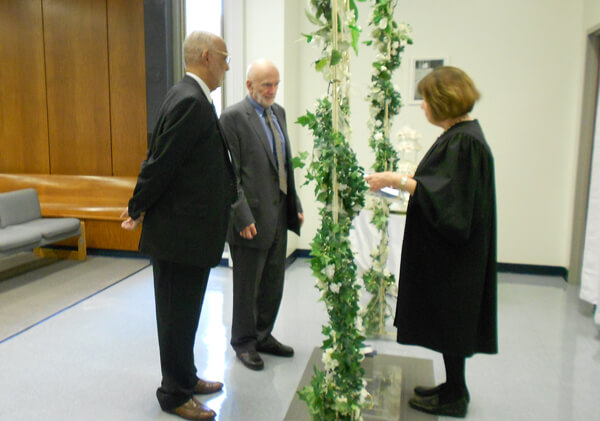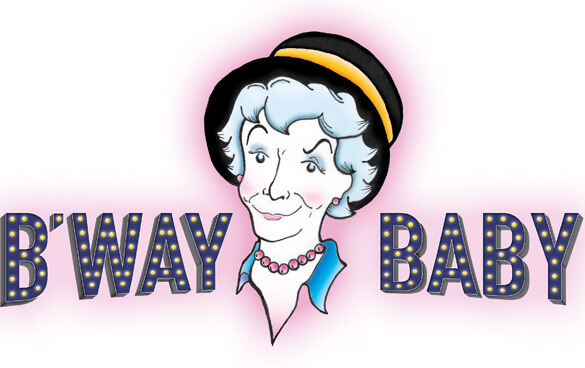Gerard Alessandrini and Maury Yeston. | CAROL ROSEGG
“I’ve been wanting to do a Maury Yeston for many years,” the ultra-genial theatrical eminence Gerard Alessandrini (“Forbidden Broadway,” “Spamalot”) said to me at the Galaxy Diner, just around the corner from the theater where he was in rehearsals for “Anything Can Happen in the Theater: The Songs of Maury Yeston.”
“Maury’s always writing songs,” Alessandrini continued. “He has hundreds of them, many of them unheard and unused in shows, along with those from ‘Nine,’ ‘Titanic,’ and ‘Grand Hotel.’ I first met him at the BMI workshop for musical theater when he had taken over as director after Lehman Engel died, and I also worked with him on his Biblical musical, originally called ‘One Two Three Four Five.’
“I said to him, ‘You should do a revue of your songs and introduce them. He said, ‘I don’t want to do that hosting, but I really want to feature all of these songs that have never been heard before.’ We worked on it for about two years, configuring all the material and now we’re up and running. ‘Let’s do it at The Triad,’ I told him, ‘a lovely place, we don’t have to go out of town — we’ll do it as a ‘Cocktails with Maury,’ thing,” so it’s one of those nice revues that you see at 7 p.m. in the club with a drink in your hand. I knew the place from doing ‘Spamilton’ [Alessandrini’s hilarious spoof of you know what], and way before that when I did ‘Forbidden Broadway’ there, when it was known as Palsson’s.”
Premiere theatrical satirist, esteemed character actress chew the fat
The night I caught “Spamilton” was the debut night of its new replacement female lead, Nicole Vanessa Ortiz, about whom Alessandrini said, “What a voice, and now she’s really gotten into it, so beautiful and nice, only 23. She’s never missed a performance and is celebrating her 200th performance, then finally taking a vacation in November. But all my cast has been exceptional, rarely missing a performance during this long run. I’ve been really blessed, and for Maury’s show we have Robert Cuccioli, Jill Pace, who was ‘The Woman in White’ and played Scarlett O’Hara in the musical of ‘Gone with the Wind’ about five years ago. Alex Getlin is really a find, with an unusual voice that makes you go ‘Wow!’ She’s definitely got a belt but she’s also like a Nancy LaMott or even Garland. Nobody sings like that these days. Also, Justin Keyes and Michael Maliakel, both wonderful.”
Justin Keyes and Michael Maliakel in Anything Can Happen in the Theater: The Songs of Maury Yeston,” at the Triad through October 21. | CAROL ROSEGG
The revue will include something from “Goya,” the musical Yeston wrote for Placido Domingo.
“A recording was made of it, but it was never produced as Domingo couldn’t commit to it for more than five months due to other commitments. Yeston is very much a musical theater writer, in the best sense of the word. His songs propel the action, keep you interested and informed, and are dramatic. He knows how to do that, and also writes with irony. Pop music doesn’t have to do all that, and Yeston really cares about character development and can write a lyric like a character would sing it.
“It was actually rather difficult to put this together because the songs are very character-specific. For instance, one of his masterpieces is the opening number from ‘Titanic,’ with everyone boarding the ship, but you can’t do that in a revue, like certain songs from ‘Grand Hotel.’ Our task was to be able to isolate certain songs and bring them forward.
“What I like most is the fact that half of it is all new songs, some he wrote for this and some he wrote before. Before its final Jerry Herman incarnation, Yeston wrote for a version of ‘La Cage aux Folles’ which Mike Nichols and Tommy Tune wanted relocated to New Orleans, called ‘The Queen of Basin Street.’ But that never came to pass as the owners of the rights to the show wanted it to remain in St. Tropez.”
Surprisingly, Mr. Musical came late to the form, having an Italian family more obsessed with opera, “so by the age of four I already completely knew ‘Aida,’ ‘Carmen,’ and ‘La Traviata.’ But by the first grade, my parents were worried because I was playing the record of ‘Die Fledermaus’ constantly. They enlisted the aid of nuns at my school who told me that, as it was Lent, I should give up that record as penance. But then they felt so bad about doing that to me, they offered me an album of “Hansel and Gretel.” That didn’t do it for me, too Germanic, but then they gave me ‘The Merry Widow’ and I became as obsessed with that as ‘Fledermaus’ for three years. And then in fourth grade I went to play at my cousin’s house and she wasn’t there, so my aunt — who wanted to talk with my mother — said, ‘Gerard, I just saw the most wonderful show in New York!’ She sat me down and got me this record, and it was just wonderful, with the paperback of the lyrics I could follow along to.
“It was ‘My Fair Lady,’ and it sounded just like ‘The Merry Widow’ at the beginning, the songs were so melodic and you know composer Frederick Loewe’s father was the original tenor in ‘Widow.’ Those lyrics were really funny, and I thought, ‘I can do that — write funny words to great melodies.’ Then the movie came out, followed by ‘The Sound of Music,’ ‘Mary Poppins,’ etc., and I became obsessed with them.
“We lived outside Boston, and the first Broadway show I saw was ‘Follies,’ during tryouts there, so no wonder I then became really obsessed. I didn’t know any better and when someone said, ‘Oh, there’s Stephen Sondheim over there,’ I went over and talked to him. He was very nice and I kept going back to the show every week. One night, Yvonne De Carlo skipped the song ‘Can That Boy Foxtrot,’ which had brought the house down.
“I asked Sondheim about it, and he said that since she was an important movie actress, he thought he had better write one important song for her. That’s what a great theater man does, no matter how good something is, he will throw it out to make the show better. Maury is the same.”
I mentioned how I thought the highlight of the movie version of Yeston’s “Nine” was Kate Hudson’s sizzlingly sexy “Cinema Italiano.”
“I liked that song, too, and wanted to include it, but Maury didn’t want to use it. I think it was originally composed for just the credit crawl at the end of the movie, but somehow it got changed into a stand-alone number for Kate, and she was great in it. He’s also working on a musical version of the film ‘The Lady Eve,’ and I believe Jane Krakowski did a reading of it. The songs are really funny, and the book was written by Tom Meehan who just died this summer, so that was his last rewrite.”
Although raised Catholic in an Italian family in the repressed 1950s, Alessandrini never really had a problem being gay.
“I never really came out, never had to, my parents just loved and accepted me. I guess it wasn’t hard for people to figure it out. I don’t remember ever hiding it in any way, but I didn’t flaunt it. When you’re in the theater, it’s different.
“I’ve had three major relationships, and I was always welcome to bring them home to meet the family. I guess when I was in my early 20s, with the first success of ‘Forbidden Broadway,’ I was so driven — writing and performing and producing — I didn’t have a lot of sex and, also by the time I got to New York, AIDS was an issue, so I wasn’t having sex because of fear, too. I started dating more in my 40s, and am now in a happy relationship with Glenn Bassett. He was very helpful to me on shows, and now is playing King George in ‘Spamilton.’ He’s 19 years younger than me, takes good care of me, is really cute, and caring, and I love him more each day.”
Alison Fraser in Aaron Mark’s “Squeamish,” at the Beckett through November 11. | MARIA BARANOVA
Though Vivien Leigh’s Blanche DuBois was the finest performance on film, that role took an immense mental as well as physical toll on her, literally driving her off the deep end, so complete was her identification with that neurotic Southern belle, exacerbated by the actress’ own history of mania, not to mention tuberculosis. Although I firmly believe Alison Fraser is as tough a lady as she is a fine actress, I confess to becoming a little concerned when she described her latest role in “Squeamish,” the solo work Aaron Mark wrote for her.
Adorably petite and chic in a classic black cocktail dress, she slid into a booth at Theater Row Diner, and told me, in her cherishably husky voice, “Aaron is insanely talented and this is the latest in his psychological horror solo play series, which have included ‘Another Medea’ with the great Tom Hewitt as a gay Medea, and ‘Empanada Loca,’ with Daphne Rubin- Vega, that was spectacular. Here, I play a therapist who is looking for true balance and it’s all about how she finds it. She is addicted to painkillers and was an alcoholic and, as we know, there’s a disproportionate amount of suicides among therapists.
“I tend to go for the seedy underbelly of any character I do, and with Aaron that is right out there on the surface to begin with [laughs]. He sees a darkness in me, which no one else does, and channels it into these plays he’s written for me, as a kind of muse to him. So what I have to do is very much normalize this woman and make her be able to function in the world.
“All I do is work on this role, which is 45 pages long, a monologue, which I am learning by having it printed out as if it were music I’m learning. It’s the only way — I’ve not even had a drink in two months because for this I need every possible brain cell at my fingertips just to memorize it, as I want to get every single word right, and am so honored that he wrote this for me.
“I’ve lost 10 pounds, and the only other thing I do is watch CNN and CNBC, which only makes me crazier. I spend 16 hours a day on this play and am like a nun. After the election, I went into a severe depression and couldn’t get out of bed. I started seeing a therapist, who told me that people are everywhere are being affected by this in the same way, especially in New York.
“The other night I went to see ‘Hello Dolly!’ with my dear friend Donna Murphy, who is fabulous. But the show is so happy, so pastel, that I was sitting there like a nun, going, ‘What is this strange world? Why are the lights so bright and the audience so happy?’ There’s a line in my play, ‘Maybe I am some alien creature who is not fundamentally equipped to deal with this world.’ ‘Dolly’ is a brilliant show, the happiest show on Broadway, but I am not of that world anymore, not anymore.”
That certain “seedy underbelly” stood Fraser in good stead when she delivered the greatest, funniest, and most tragic Tessie Tura I’ve ever seen in the Patti LuPone production of “Gypsy.”
“Did you hear Patti gave me a shout-out at her Broadway Cares concert?” Fraser asked. (I did.) “Ben Rimalower, whose shows Aaron has directed, told me about it, that she said I was brilliant in the show. When I was doing it, I didn’t think about that at all, but now, hey I’ll take it!
“Arthur Laurents [who wrote and directed ‘Gypsy’] said in his book that I was his favorite Tessie because I was exceedingly dark. To me, she was this woman at the end of her rope, no education and fast approaching the time when she would no longer be able to do her job. What really happened was that the real Tessie went on the road with Gypsy Rose Lee as her dresser.
“I begged Arthur, ‘Please, please, in the final scene when Rose comes to see Gypsy and they have the big fight, instead of the maid answering the door, have it be Tessie, her hair all grown out, wearing a house dress like Thelma Ritter, smoking a cigarette, like the guardian gargoyle.’ I could see him visualizing it, and thought if I could only figure out a way to make him think he had thought of it, himself. Some day someone will do it and get all the credit for it. You watch!”
The most daunting of curmudgeons, Laurents never suffered fools, and Fraser agreed.
“But he liked me, and we bonded because his partner Tom and my husband both died, while being treated by the same star cancer doctor. He called one time and asked what I was doing and would I want to have lunch with him and see ‘West Side Story?’ Uh, yeah! To sit and watch that show next to the man who wrote it? But then this poor kid who was playing Chico who comes on with the gun at the end was late for his entrance. I feel this crab claw clutching my knee and whispered, ‘Arthur, it’s okay,’ but I feared the kid was going to get the gate.
“I was late for an entrance in his show once, too. ‘Ohmigod, he’s gonna kill me,’ I thought and, sure enough, there he was after the show, in front of everyone quaking for me, steam coming out of his ears. I suddenly got inspired, threw my arms out like a martyr saint, and screamed, ‘Fire me! I would fire me too if I did what I did to you! Fire me!’
“He said, ‘Goddamit, now I can’t do it!’ It was hilarious.”
ANYTHING CAN HAPPEN IN THE THEATER: THE SONGS OF MAURY YESTON | Triad, 158 W. 72nd St. | Oct. 12 at 9:30 p.m.; Oct. 13, 17, 18, 20 & 21 at 7 p.m. | $40-$80 at triadnyc.com or 212-279-4200
SQUEAMISH | Beckett Theatre at Theatre Row, 410 W. 42nd St. | Through Nov. 11: Mon.-Tue. at 7 p.m.; Wed.-Sat. at 8 p.m. | $52.25 at theatrerow.org/beckettnowplaying




































